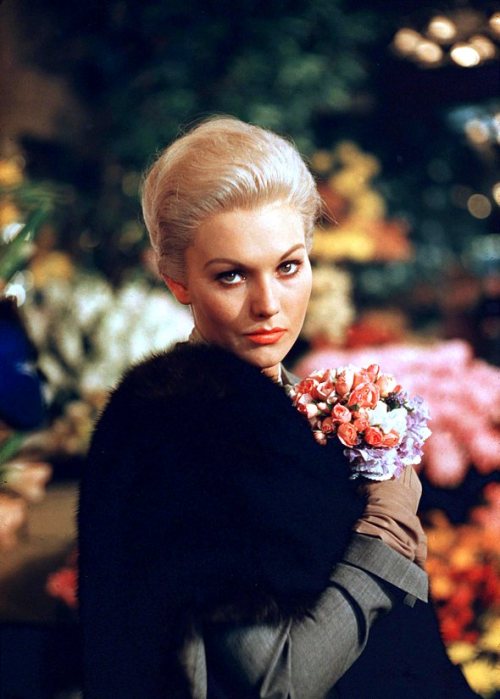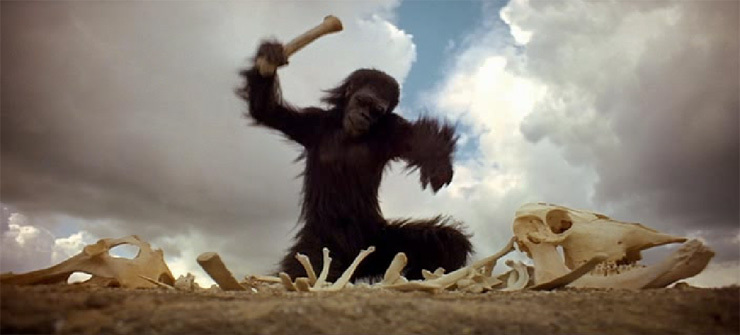So, Orson Welles' revolutionary classic Citizen Kane has been dethroned from the top spot of the British film magazine Sight & Sound's Top Ten Greatest Films Poll. It's seat has now been filled by Alfred Hitchcock's Vertigo, the film considered by many to be Hitchcock's masterpiece. And while Citizen Kane still holds the number 2 spot, it's quite a shakeup considering its held the number one position for fifty years.
The first Sight & Sound poll was conducted in 1952. The film that ranked number one on that first poll was Vittorio De Sica's Neorealist Bicycle Thieves. Citizen Kane, released in 1941, was no where to be found. On his commentary for the DVD, film critic Roger Ebert mentions that the film, due to the controversy surrounding its similarities to the life of William Randolph Hurst, the newspaper baron, Hurst used his powerful influence in order to make theatres limit the number of showings for Citizen Kane, leading to poor box office. Ebert says it was only in the late fifties that many people were able to see the film. The lack of exposure for the film back in 1941 may have a role in keeping it out of the Sight & Sound Top Ten.
It was only ten years later, in 1962, when the film entered the top ten and claimed the number one spot, keeping that spot over the decades, as other films entered or fell out of the top ten. In 1952, Charlie Chaplin held the number 2 and 3 spots with City Lights and The Gold Rush, respectively. Sadly, from 1962 onwards Chaplin is completely absent from the top ten, with City Lights ranking 50th this year. For that devastatingly beautiful last scene, I feel it should be much higher. One film that has slowly crept up the list is Hitchcock's Vertigo. A film that, on its initial release, was met with poor box office and negative reviews, entered the top ten in 1982, tieing with Welles' The Magnificent Ambersons and Michelangelo Antonioni's L'avventura for the seventh spot. In 1992 it climbed to the number 4 spot and in 2002 it was number two right behind Citizen Kane.
Now Vertigo has claimed the number one spot, edging out Citizen Kane by 34 votes (Vertigo: 191, Citizen Kane: 157). The question remains: does it mean anything that Vertigo is now in the number one position? Many people will still feel Citizen Kane is the greatest film ever made while others will still feel it's "overrated." Some have already argued that Vertigo isn't really Hitchcock's best film (for me, Rear Window is my favourite of his but I feel Vertigo is his greatest film). Ultimately, it comes down to the slow shift of perspective regarding Hitchcock's film. It look a little longer for it enter the top ten and even longer to reach the top spot. It didn't automatically claim the spot as Citizen Kane did. But over time, Vertigo is one of those films that keeps reminding viewers, new and old, how great and timeless it truly is. It's a film that captures the obsessive and twisted forms love can take-especially within the male psyche. It starts out as a mystery about a woman, Madeline (Kim Novak) who may be possessed and the former detective, Scottie Ferguson (James Stewart), assigned to follow her-and becomes the story about a detective being haunted by her spirit, becoming possessed himself by the need to mold another woman, Judy (the same woman in fact), in to Madeline's image. It's essentially a character study that doesn't reveal itself as a character study until the third act.
And like Citizen Kane, it never truly resolves itself. It allows the audience to interpret what they've seen and draw their own conclusions regarding the title characters. Can the loss of his sleigh Rosebud truly define Citizen Kane's titular character, Charles Foster Kane's (Welles) life? Or is it impossible, as the reporter Mr. Thompson says, to define an entire man's life by just one word? In Vertigo, what happens to Scottie after the death of Judy? Is he able to finally move on or will he plunge even deeper in to his obsessive abyss? Both films show men brought down by ambition and obsession. Citizen Kane is about a man who had everything in his life but love. Vertigo is about a man who can only love a woman if she fits the image of his obsession- and the woman who will change herself in order for him to love her.
But, back to the question at hand. What does it mean for Vertigo to be in the number one position. Well, as I said, the perspective regarding the film has changed and evolved slower than Citizen Kane and this year more people felt it was the greatest film ever made. Some have argued that Kim Novak's comment about feeling "raped" when this year's Best Picture winner, The Artist, used Bernard Herrmann's score, brought the film back to some people's minds, which may have led to some viewing it again. While that may sound humorous, it's not too big of a stretch that this comment made people revisit the film.
After 50 years, some voters may have felt it was time for a new film to take the number one spot. Some of these voters may have been new, some may have just come around to Vertigo after years of ranking it lower on their ballots or not ranking it at all. Now that Vertigo has placed number one, the best possible outcome is for more people to discover the film as well as other Hitchcock's films. Whether Vertigo is the greatest film of all time, I feel it's definitely one of the greatest films in cinema history.
Now, what of the rest of the list? What's fascinating, and maybe a little bit disappointing, is that the youngest film in the top ten is Stanley Kubrick's 2001: A Space Odyssey, released in 1968. So, the most recent film in the top ten came out over forty years ago. Contrast this with the first Sound & Sight Poll in 1952 where Bicycle Thieves, released only four years prior in 1948, topped the list. City Lights (1931, #2) was only 21 years old and The Gold Rush (1925, #3), only 28 years old when they ranked high on the list.
Now, there was "slightly" less film history in 1952 and more room for twenty year old films to appear on the list-but even when you look at the 1962 list, Citizen Kane was only 21 years old when it first claimed the top spot and was still only 31 years old in 1972. L'avventura was only 2 years old when it appeared on the 1962 list. Federico Fellini's 8 1/2 was only 9 years old when it appeared on the 1972 list. Now, in 2012, there are no films from the last five, ten, twenty or even thirty years in the top ten. No Pulp Fiction or Schindler's List. No There Will Be Blood or Fargo. The Godfather and The Godfather Part II, which appeared together on the 2002 list, have now fallen out of the top ten. This may be due to the rule change that wouln't allow them to be counted as one film.. A Martin Scorsese film has also never appeared in the top ten. Taxi Driver is ranked 31 this year, tieing with The Godfather Part II. Raging Bull, and Goodfellas are not ranked within the top 50.
For reference, this is the top ten for 2012:
1. Vertigo (1958, Hitchcock)
2. Citizen Kane (1941, Welles)
3. Tokyo Story (1953, Yasujiro Ozu)
4. The Rules of the Game (1939, Jean Renoir)
5. Sunrise (1927, F.W. Murnau)
6. 2001: A Space Odyssey (1968, Stanley Kubrick)
7. The Searchers (1956, John Ford)
8. Man With a Movie Camera (1928, Dziga Vertov)
9. The Passion of Joan of Arc (1928, Carl Theodor Dreyer)
10. 8/12 (1963, Federico Fellini,)
Now, I've seen eight of the 10 films listed (I still haven't seen Sunrise or Man With a Movie Camera) and while it's a more than respectable list, it does feel a little boxed in. While the voters didn't sit down and decide not to have any post sixties films in the top ten, it's unfortunate that many of the great films from the 70s, 80s, 90s and the last decade are only represented outside of the top ten.
Now, Casablanca is my favourite film and it's not ranked at all. While I understand it's not as revolutionary as Citizen Kane or as psychologically probing or disturbing as Vertigo, its characters are as memorable and enjoyable as the ones in the aforementioned films, and while its filmed in a very classical Hollywood style, its images, the closeups of Bogie and Bergman, among others, really resonate. While I'm not a voter I've decided to throw out a top ten made up of personal favourites and films I just feel are great.
1. Casablanca (1943, Michael Curtiz)
2. Rear Window (1954, Hitchcock)
3. The Apartment (1960, Billy Wilder)
4. 12 Angry Men (1957, Sidney Lumet)
5. Citizen Kane (1941, Welles)
6. The Passion of Joan of Arc (1928, Dreyer)
7. Vertigo (1958, Hitchcock)
8. Taxi Driver (1976, Scorsese)
9. The Godfather (1972, Francis Ford Coppola)
10. Psycho (1960, Hitchcock)
And look, I only have one film from the seventies. Aren't I hypocritical. Pot, Kettle.There's also so many I left out! Singin' in the Rain!, GFII!, Goodfellas! Damn you lists! Anyway, those are some of my thoughts regarding the new Sight & Sound Poll. Whatever meaning lists like S&S have, if they make you want to revisit films you haven't seen for a while or discover one you've never seen, well, I think that's a pretty good thing.
P.S: Here's a piece I wrote on Vertigo's influence on Scorsese's Shutter Island and Christoper Nolan's Inception: http://thenoirzone.blogspot.ca/2012/05/hitch-marty-and-chris-vertigo-and-its.html






No comments:
Post a Comment